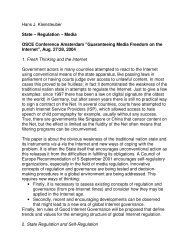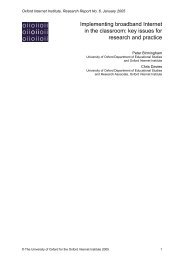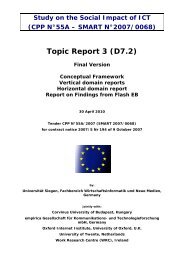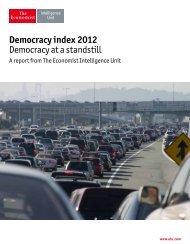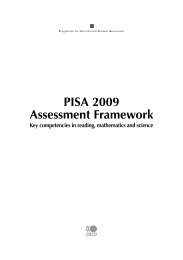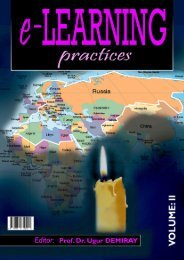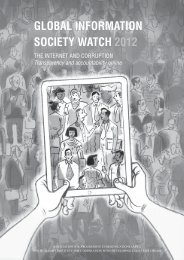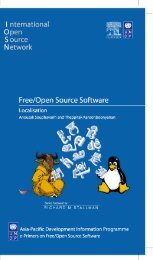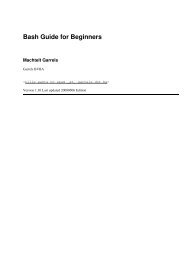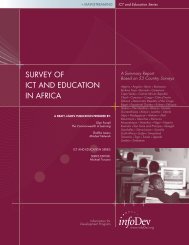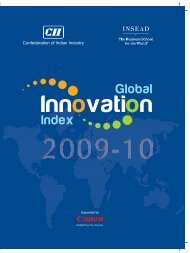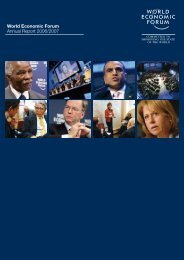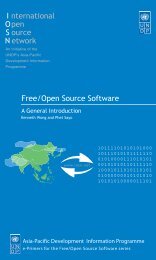Internet Freedom A Foreign Policy Imperative in the Digital Age
Internet Freedom A Foreign Policy Imperative in the Digital Age
Internet Freedom A Foreign Policy Imperative in the Digital Age
Create successful ePaper yourself
Turn your PDF publications into a flip-book with our unique Google optimized e-Paper software.
Civil and Political Rights. Article 19 of <strong>the</strong> UDHRstates that <strong>the</strong> right to free expression exists <strong>in</strong> anymedium and on any frontier, and Article 20 protects<strong>the</strong> right of everyone to peacefully assembleand associate, a right that Cl<strong>in</strong>ton has argued isguaranteed <strong>in</strong> cyberspace as well. 102At <strong>the</strong> same time, <strong>the</strong> U.S. government has triedto codify norms that would re<strong>in</strong>force free expressionand block efforts to restrict it. The 2005 WorldSummit on <strong>the</strong> Information Society (WSIS), aU.N.-sponsored ga<strong>the</strong>r<strong>in</strong>g of 174 countries, produceda consensus statement recogniz<strong>in</strong>g that“freedom of expression and <strong>the</strong> free flow of <strong>in</strong>formation,ideas and knowledge, are essential for<strong>the</strong> Information Society and beneficial to development.”103 In 2008, <strong>the</strong> member states of <strong>the</strong>International Telecommunication Union (ITU)adopted a resolution pledg<strong>in</strong>g to “refra<strong>in</strong> from tak<strong>in</strong>gany unilateral and/or discrim<strong>in</strong>atory actionsthat could impede ano<strong>the</strong>r Member State to accesspublic <strong>Internet</strong> sites.” Accord<strong>in</strong>g to AmbassadorDavid Gross, <strong>the</strong>n <strong>the</strong> top State Department officialmanag<strong>in</strong>g communications and <strong>in</strong>formationpolicy, <strong>the</strong> deliberations made clear that “memberstates” meant not only governments, but also <strong>the</strong>civilians of those countries. 104Cont<strong>in</strong>ued U.S. leadership is critical to fill whatrema<strong>in</strong>s a normative vacuum. Part of <strong>the</strong> difficulty,however, lies not only with authoritarianregimes, but also with some of America’s closestdemocratic partners. While <strong>the</strong> U.S. governmentrecognizes some limits on free expression – childpornography, slander, perjury, “fight<strong>in</strong>g words”and certa<strong>in</strong> o<strong>the</strong>r forms of expression are illegal,onl<strong>in</strong>e or off – its commitment to free speech isnever<strong>the</strong>less <strong>the</strong> strongest of any major country.Germany, for <strong>in</strong>stance, prohibits Holocaustdenial onl<strong>in</strong>e; France does not allow <strong>the</strong> sale ofNazi paraphernalia over <strong>the</strong> <strong>Internet</strong>; and Turkeybanned YouTube for two years because it refusedto remove videos <strong>the</strong> courts deemed <strong>in</strong>sult<strong>in</strong>g toMustafa Kemal Ataturk. Governments <strong>in</strong> Brita<strong>in</strong>,Italy and Germany have also established lists ofblocked websites – particularly those conta<strong>in</strong><strong>in</strong>gchild pornography, onl<strong>in</strong>e gambl<strong>in</strong>g or hate speech– but <strong>the</strong>se lists are often nei<strong>the</strong>r transparent noraccountable to <strong>the</strong> public. 105Authoritarian countries <strong>in</strong>evitably attempt toshield <strong>the</strong>mselves from criticism and pressure bypo<strong>in</strong>t<strong>in</strong>g to democracies that ban onl<strong>in</strong>e speech.Deny<strong>in</strong>g <strong>the</strong>m <strong>the</strong> opportunity to do so successfullyrequires <strong>the</strong> United States and o<strong>the</strong>rs toarticulate, publicly and consistently, <strong>the</strong> dist<strong>in</strong>ctionbetween restrictions on free speech put <strong>in</strong>toplace by democratic political systems through dueprocess and those enacted by dictatorships. WhileAmericans may disagree with <strong>the</strong> limits on onl<strong>in</strong>eexpression enforced by democratic partners, <strong>the</strong>sedecisions are never<strong>the</strong>less made through participatorypolitical systems while restrictions imposed byautocratic regimes are not.Def<strong>in</strong><strong>in</strong>g “cyber security,” and determ<strong>in</strong><strong>in</strong>g <strong>the</strong>legitimate steps a government may take to ensureit, also poses a significant challenge to America’s<strong>Internet</strong> freedom efforts. 106 Most democratic governmentsuse <strong>the</strong> term to mean protect<strong>in</strong>g aga<strong>in</strong>stassaults on and <strong>in</strong>trusion of cyber systems andcritical <strong>in</strong>frastructure, such as electric utilities,government servers, f<strong>in</strong>ancial systems and telecommunicationsnetworks. In contrast, some o<strong>the</strong>rgovernments argue that <strong>the</strong> term should <strong>in</strong>clude<strong>the</strong> notion of “<strong>in</strong>formation security” – regulat<strong>in</strong>gcontent. Russian officials, for example, haveemphasized that <strong>in</strong>formation security requiresbalanc<strong>in</strong>g <strong>in</strong>dividual, social and state <strong>in</strong>terests. 107Such notions have real world consequences:Russia’s federal security service recently proposedbann<strong>in</strong>g Skype, Gmail and o<strong>the</strong>r platforms because<strong>the</strong>y are “uncontrolled” platforms that use encryptiontechnology for secure communication. 108 TheUnited Arab Emirates made similar claims <strong>in</strong> 2010when it banned <strong>the</strong> use of BlackBerry services,compla<strong>in</strong><strong>in</strong>g that it could not access encryptedcommunications. 109| 27



